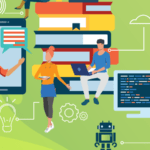In the last few years, people’s use of various digital technology, be it computers, smart phones and even virtual reality has increased significantly both at home and in the work place.
Using digital learning environments in teaching may therefore seem a logical step in the evolution of education systems, since computers, smartphones and other appliances are so widely used in society, especially by young people. But what does this imply for more traditional learning and teaching methods? Will pen and paper become as obsolete as rubbing two sticks together to make fire?
The discussion of incorporating more technology-based learning environments into teaching is a hot topic. The European Commission, for example, has anAction Plan with 11 actions to support technology-use and digital competence development in education. For schools, these include improving internet connectivity and increasing awareness on cyber security, as well as addressing the gender gap in digital and entrepreneurial skills.
Implications on traditional education
Traditional classroom teaching may sometimes seem incompatible with today’s information society – not least by pupils who may wonder why they should be forced to put down their smartphones and pick up a book. Yet while it is often said that young people are well versed in new technology, and would thus be motivated to use it for learning, there is evidence from international comparative surveys and tests that digital natives are not necessarily always digitally competent.
For pupils to get best results when learning with computers and online technology, it is imperative that teachers have the skills to guide them. Indeed, the forthcoming Eurydice report on digital education examines how digital competences of teachers have been incorporated into teacher competence frameworks. These frameworks are a collection of statements about what a teacher as a professional should know, understand, be able to do, and which values and attitudes they should have.
It is inevitable that learning in digital environments will increase in the future, and the hope is that this should ensure that pupils will also become more digitally competent. This is no doubt the thinking behind reforms in education systems such as Finland that seek to replace a focus on learning to write by developing children’s keyboard skills.
Reforms on education
Rightly or wrongly, when Finland introduces a reform to its education system, other countries often follow. However, in this case learning “analogically” with pen and paper has benefits that we may not want to abandon. Research shows that our brains seem to be wired to retain information more easily if we write things down, because we need to process the information while writing with a pen. This seems to help learning and retention of information, while typing notes on a computer is a more “brainless” activity. Moreover, a meta-study has shown that reading on paper rather than on screen improves students’ text comprehension. And even in Finland itself, preliminary results from a forthcoming study point to the fact that using new digital teaching methods do not necessarily lead to better academic performance.
What really matters
What matters is the quality of learning rather than the methods we develop for teaching. Pen and paper may remain at least as mighty as the keyboard or touch-screen for some time to come – at least as far as effective learning is concerned.
More information
Authors: Jari Matti Riihelainen and David Crosier







Leave a Reply